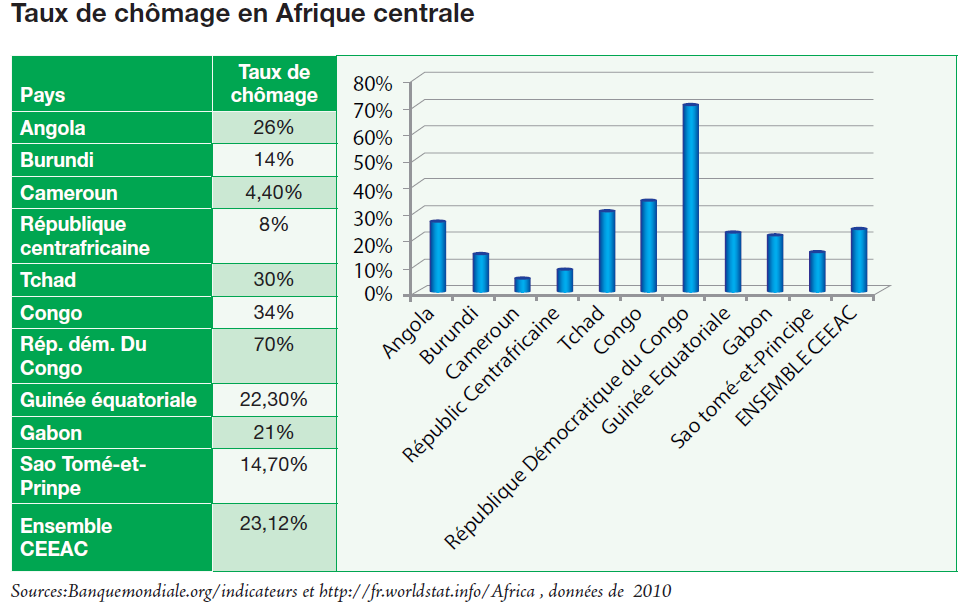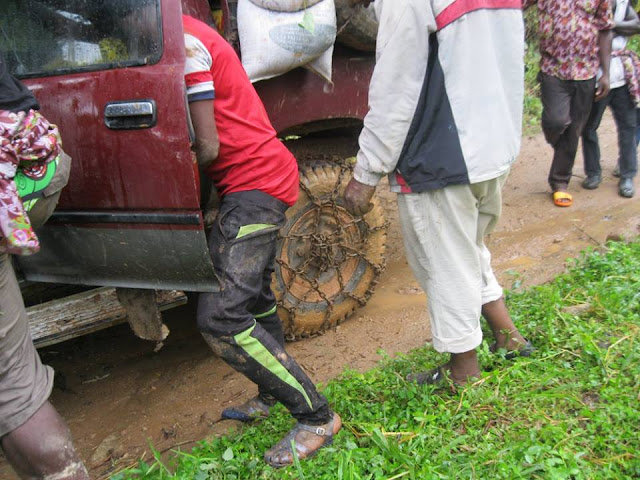YOUTH EMPLOYMENT, UNEMPLOYMENT AND SOCIAL PROTECTION IN CENTRAL AFRICA
COURTESY: TRANSFORMING OUR WORLD
YOU CAN ACCESS THE ORIGINAL ARTICLE IN FRENCH HERE:
No activity could
have been too great or too insignificant for the World Day of Decent Work which
comes up on 7th October each year, including round tables,
publication of articles, major gatherings among others.
Unemployment and Underemployment in Central Africa
The unemployment rate in the Central African subregion
is very high (23.12%), and is much higher in some countries like the Democratic
Republic of Congo (70%) or Chad (30%). The rate is even
higher if we include underemployment. In fact, in a country like Cameroon, by implementing the ILO's definition,
which remains disputable in the case of some African countries, an unemployment
rate of 4.4% was obtained.
However, the rate of underemployment stands at 75.8%
according to the ECAM 3 Survey. This situation can be explained by the fact
that the informal sector is dominant and employs more than ¾ of the active population
of the country.
Often, these people are employed without consideration
of their abilities or training. Also, their working conditions are poor. The issue of the
lack of decent job opportunities is a grave concern in the subregion.
The work that remains to be done in this domain is
enormous and leaders in the subregion will have to act fast. It is for this reason that the fight against unemployment, the creation of
decent work and the significant reduction of the informal sector should feature
at the top of the agenda for the coming years if sustainable development is to
be attained.
Socio-economic integration of youths and women
Youth unemployment is preoccupying, to say the least! The labour market is tense, especially in the cities, with massive influx
of people from the country side. This is part of a much bigger problem, that of the socio-economic
integration of the underprivileged classes. It is mostly people from rural areas, youths and women who are affected by
unemployment. Underprivileged youths in Central Africa, considering
the characteristics of this group and the fragility of social and political
systems in the area, constitute a veritable time bomb which can ignite
conflicts in the area at any time, if action is not taken to defuse the
tension.
It will be interesting to further elucidate the issue
of the socio-economic insertion of youths and women as a means of fighting
poverty, creating wealth, preventing conflicts and therefore reinforcing
socio-political stability. Extant policies seem to be lacking in innovation, given the meteoric rise
in youth unemployment.
Three options are to be considered: i) allocate more
resources for youth employment initiatives; ii) implement systematic evaluation
of public employment policies implemented by states in this area to ensure that
youth and women's employment issues are given adequate consideration; and iii)
institute the reinforcement of entrepreneurial skills across all domains by
appropriate training and financial assistance to project initiators, training
of trainers in the assistance of micro-entrepreneur youths, and the
strengthening of life skills among youths. These are the skills that enable belief in the future and encourage youths
to acquire the critical skills and civic sense of responsibility, and thus
enable them to reject adventurous enterprises.
Universalising social insurance
Recently, there has been a tendency to generalise
social insurance, which takes the form of health care mutuals. This is an
interesting development, but with a relatively modest impact, given that the
health insurance systems are fragile, with respect to their viability, due to
their small sizes and poor structure, lack of management and monitoring tools
for day to day functioning, and due to the fact that the "small risk"
guaranty is favoured, this being too small and unattractive because of
co-payments (Letourmy et al., 2005).
Experts consider that there are currently three (3)
key issues at stake: i) How to influence the development of mutuals in a way
that prevents a proliferation of a very large number of small organs with
unsure viability? ii) Does the "small risk" insurance have the
vocation of serving as health insurance and health mutual product? iii) How can
the technical functioning of the mutuals be enhanced while maintaining a high
degree of social participation? (Letourmy et al. 2005).
Decent work and
the sustainable development goals
Decent work summarizes what humans aspire to in their
work. It encompasses access to productive and conveniently
remunerated work, security at the workplace and social protection for families,
better personal development and social insertion prospects, the liberty of the
individual to express their grievances, organise themselves and participate in
decisions affecting their lives, and equal opportunities and treatment of all,
both men and women.
During the UN General Assembly of September 2015,
decent work and the four pillars of the decent work agenda - job creation,
social protection, labour rights and social dialogue - were transformed into
pivotal items in the new 2030 Sustainable Development
Programme. Goal 8 of the 2030 calls for the fostering of
sustainable, lasting and shared economic growth, productive full and decent
employment; and this will be a critical engagement for the International Labour
Office and its agents. Besides, the main dimensions of decent employment have been largely
incorporated into the 17 objectives of the new development vision of the United
Nations.
Translated by Tengwan Ambe Frederick,
Oracle LSP.



PS: That 4.4% unemployment rate in Cameroon really does raise eyebrows. However, it is considered that someone doing bendskin, digging toilets occasionally or temporarily supplying manual labour in building projects, is underemployed and not unemployed. If such were to be considered among the unemployed, the the youth unemployment rate in Cameroon will shoot up to 78%. Source: National Institute of Statistics.
ReplyDelete